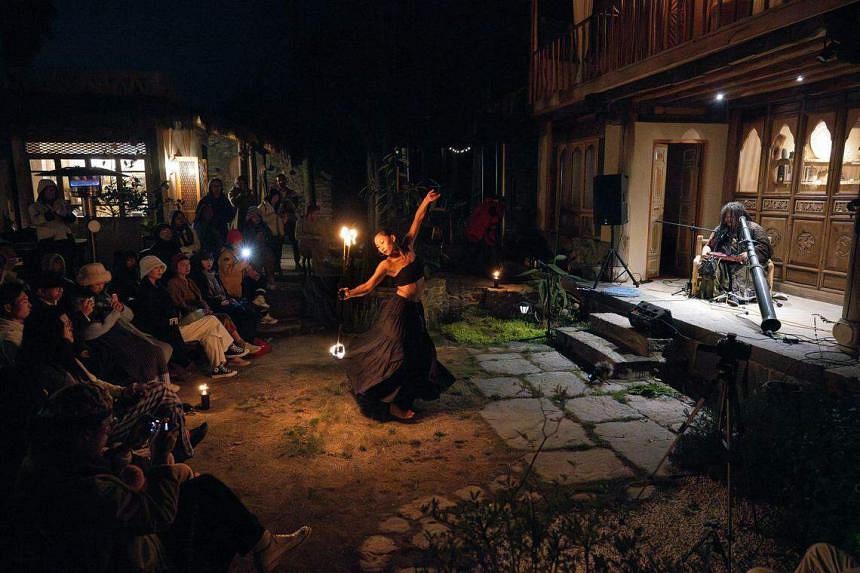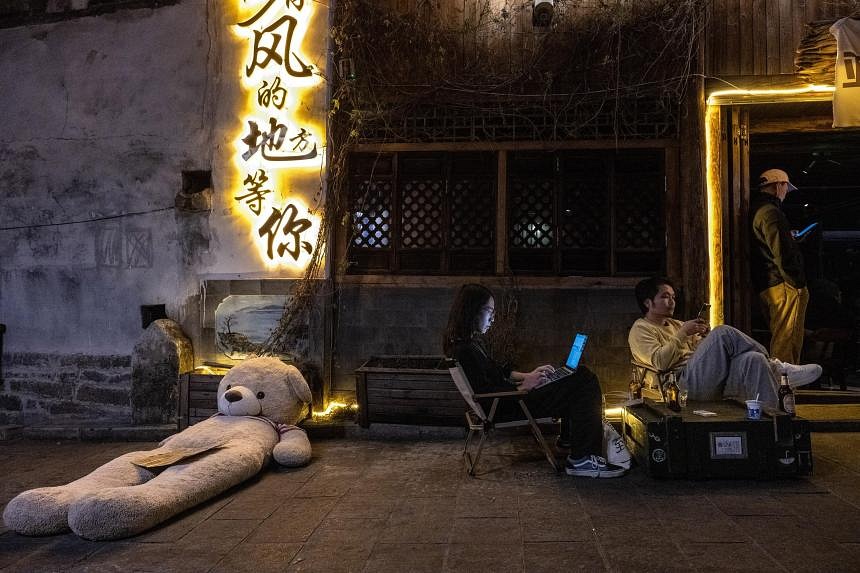DALI – To find the dance circle in the bed-and-breakfast’s courtyard, drive north from the bedsheet factory converted into a crafts market, towards the vegan canteen urging diners to “walk barefoot in the soil and bathe in the sunshine”.
If you see the unmanned craft beer bar where customers pay on the honour system, you have gone too far.
Welcome to the Chinese mountain city of Dali, also sometimes known as Dalifornia, an oasis for those who are disaffected, drifting or just plain curious.
The city’s nickname is an homage to California and the easy-living, tree-hugging, sun-soaked stereotypes it evokes.
It is also a nod to the influx of tech employees who have flocked there since the rise of remote work during the Covid-19 pandemic, to code amid the picturesque surroundings, nestled between snow-capped, 10,000-foot peaks in south-west China, on the shores of glistening Erhai Lake.
The area has long been a hub for backpackers and artists, who were lured by its cheap rents and idyllic old town, where ancient city gates and white-walled courtyard homes point to the history of the Bai ethnic minority, who have lived there for thousands of years.
But recently, Dali, in Yunnan province, has filled with a different crop of wandering souls: Young people from China’s megacities, fleeing the intense lifestyles that so many of them once aspired to.
Worn out by the high cost of living, cut-throat competition, record youth unemployment and increasingly suffocating political environment, they have turned Dali into China’s destination of the moment.
“Young people who can’t fit into the mainstream can look for only a city on the margins,” said Mr Zhou Xiaoming, 28, who moved from Shanghai three years ago.
Mr Zhou, always a free spirit, had worked in Shanghai as a teacher at an alternative school. But he found life there too expensive and wanted to explore even more non-mainstream teaching methods.
Dali had many to sample – an experimental kindergarten that taught students to hike, another focused on crafts and many homeschoolers. Mr Zhou now privately teaches one student, in a village nestled between tea fields on the outskirts of town.
“Dali is remote and pretty tolerant and very fluid, and it has all kinds of people. And most of those people are weird,” Mr Zhou said.
Depending on your point of view, Dali, population 560,000, can feel like paradise or a parody.
On a recent Wednesday, a Chinese fire dancer gyrated to the drone of a didgeridoo, an indigenous Australian instrument, in the courtyard of an Israeli musician’s home.

A few miles away, throngs of young people lining the streets of the old town peddled cheap fortune telling, as pulsing music poured out of nearby bars. At a 24-hour bookstore, a reading group scattered on floor cushions discussed Shen Congwen, a prominent 20th-century writer.
Some of the new arrivals say they want to stay forever; others acknowledge they are looking just to try on an alternative lifestyle before returning to the city grind.
Still, even the most cynical observer will admit that the city feels tangibly more open and relaxed than most other places in China.
“People here won’t deliberately try to assign you labels. You can just be yourself and be seen,” said Ms Joey Chen, a 22-year-old freelance writer who had dropped out of college and moved to Dali a month earlier from Jiangxi province.
Ms Chen was lounging in the attic reading nook of a bookstore, perusing the Simone de Beauvoir novel All Men Are Mortal. Downstairs, the walls are decorated with photos of Franz Kafka and Che Guevara.

The openness extends to potentially sensitive topics, too. At another coffee shop, a rainbow flag is tucked into the rafters. A different bookstore offers volumes on religious topics, such as Native American shamanism, Christianity and the history of Tibet.
The question is how long Dali can remain such a haven.
Tourists and influencers have flocked to Dali, wielding selfie sticks and posing in hot pink cars that businesses rent out for photo shoots. Throughout the old town, kitschy souvenir shops have replaced handicraft stalls and bookstores.
The lakeshore teems with slickly designed bed-and-breakfasts that would not be out of place in Shanghai or Beijing, often run by moneyed arrivals from those very places.
Rents have soared, driving long-time residents out of the old town and towards more remote villages.
And nowhere in China is truly immune to the tightening political climate – as Ms Lucia Zhao, the owner of the bookstore where Ms Chen was reading Beauvoir, recently learnt.

Ms Zhao, 33, moved to Dali from Chengdu in 2022 after being laid off from a tech company. She opened her bookstore, which focuses on art, feminism and philosophy, because she wanted to create a space where people could relearn to think critically, she said.
But in August, officials suddenly confiscated all her books, on the grounds that Ms Zhao had applied for only a regular business licence, not a licence specifically for selling publications.
She shut down for several months while applying for the licence and rebuilding her inventory.
She is now more cautious in her book selection. Local officials dropped in occasionally to inspect the store and recently scrutinised a display of anti-war books she had put out.
“You definitely have more latitude in Dali than in cities like Beijing and Chengdu,” Ms Zhao said. “But compared with when I got here last year, the space is shrinking.” NYTIMES

